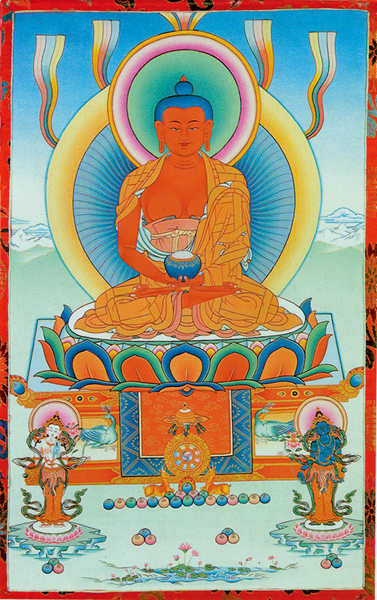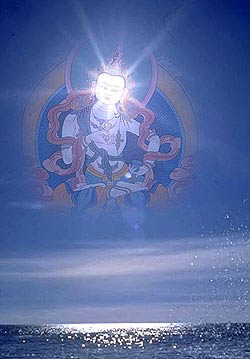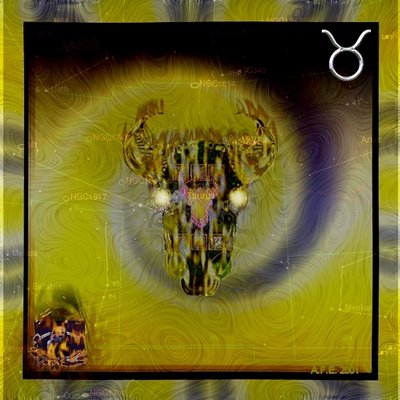
I've been thinking a bit about Sam Harris' article in the March issue of
Shambhala Sun, "
Killing the Buddha." I've argued repeatedly that Harris has a flatland view of the world as an
atheist whose worldview is based in
scientism. Harris has spoken highly of Buddhism on many occasions, and even in
The End of Faith, but his reliance on the technology of Buddhism (
meditation) at the expense of all its other elements, concerns me.
As usual, Harris argued in that article for an end to the religious elements of Buddhism, favoring instead the technologies Buddhism has imparted for transcending the little self. He would do away with all the traditional metaphors about Rinpoches having been born from a lotus flower, or anything else that seems irrational. There is no room for symbolic language in a world where scientism reigns as the dominant worldview.
But what if we take a step back from seeing the world through one limited set of lens and instead try to see the broader picture? What if we recognize that human beings develop through an ever more complex series of worldviews that allow for greater complexity and deeper understanding with each new stage? And what if we accept that each and every one of those stages is crucial to the development of individuals and cultures, and that we can never skip a stage or eliminate it from our experience, no matter how much we may find it distasteful?
If we can take this wider viewpoint in our understanding of Buddhism as well as in the rest of our lives, we will be approaching an integral worldview, and an Integral Buddhism.

As individuals and as cultures, we develop through a series of ever more complex and more compassionate understandings of the world. These stages can most simply be defined as egocentric, ethnocentric, and worldcentric. Buddhism serves each of these stages in different ways.
At the egocentric level, people seek to understand the world through the lens of their limited ego-mind. Because ego sees itself as the center of the known world, emphasis is placed on kinship patterns, power needs, and a structured universe. These Buddhists engage in rituals, believe that there are god-like Buddhas who can intercede in human lives, and take literally the Buddhist version of heavens and hells.
To rational Western thought, these beliefs seem silly --and when seen in more militant religions, such as Christianity and Islam, even seem dangerous -- but they serve a vital function for those who live in the egocentric stages of development -- they provide structure to contain the power-needs of the ego.
At the ethnocentric level, Buddhism looks more like religions we are familiar with in this country. Karma is the law of cause and effect that can seem very much like Christian versions of sin and punishment. Reincarnation is taken literally and is not much different from belief in an afterlife. It is in the upper stages of ethnocentric belief that a rational scientism can take hold and try to eliminate all the "non-rational" elements of Buddhist belief. Scientism would reduce Buddhism to meditation practices that can be observed with the tools of science.
The important thing to understand about egocentric and ethnocentric worldviews is that each stage along the path thinks it has a monopoly on the truth. From its viewpoint, every other worldview is simply wrong. This becomes most problematic in the ethnocentric stages, where there develops an Us-versus-Them mentality. Even scientism is not immune from this polarized thinking. As much as it likes to think of itself as hyper-rational, it still buys into the duality of its viewpoint against all others.
At the worldcentric stages of development, people begin to be tolerant of other viewpoints and other ways of understanding the world. At the lowest stages, this looks a lot like postmodern relativism. But at the higher stages, we begin to see an integral worldview that can honor the truth of each earlier stage and see each stage as crucial in human and cultural development.
An integral worldview understands that as we develop, we transcend each previous stage as the new one emerges. But we don't lose those earlier stages -- they continue to live within us, and they continue to have needs for understanding the world. As we transcend each stage, it is included in our options for viewing and interacting with the world. If we are put into situations that mirror the life conditions we experienced when that worldview was dominant, it can be triggered into action in order to deal with the current situation, even if we transcended that stage decades ago.
An Integral Buddhism understands these truths. It can accept that the egocentric, pre-rational elements of Buddhism address needs within each of us, even if our rational minds can't grasp that fact. An Integral Buddhism understands that ethnocentric, rational elements of Buddhism are crucial to a well-rounded practice. An Integral Buddhism seeks to include elements from all of our previous stages into its practice, everything from ritual offerings to 100,000 bows, from prayer to Tara worship, from mindfulness practice to nondual consciousness.
An Integral Buddhism does not reject any safe and compassionate practice that addresses needs in the human psyche for transcending the ego. We do not need to kill the Buddha -- we need to honor the full spectrum of ways we can follow his teachings.
Tags:
Buddhism, Integral Buddhism, Buddha, Sam Harris, Egocentric, Ethnocentric, Worldcentric, Intergal, Worldviews, Transcend and Include, Shambhala Sun, religion, culture



























